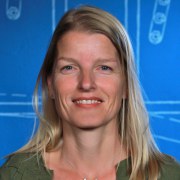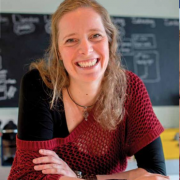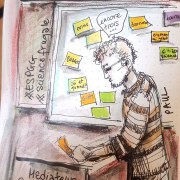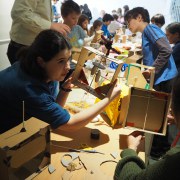Family engagement in times of COVID
Museums have for years been trying to reach out to other groups within society, striving to engage them into STEM topics, but during the pandemic the need for engaging a more diverse group of families became more and more relevant. The pandemic also amplified the need to provide meaningful family engagement reaching families where they are - at home!
How can we use making and tinkering activities to broaden participation, ensuring equity & inclusion in our work? What are the tools required for effective family engagement during the pandemic? What were the challenges we faced & what are the unique opportunities we can seize?
In this interactive virtual session, participants will learn about different approaches of engaging families in making and tinkering programmes – outside the museum, offline and online. Come and learn how three maker programmes pivoted during the pandemic to reach families with children from underserved communities.
Session speakers
Learnings from our food bank initiative.
Meie will present the tinkering project she has set up in the very poor neighbourhoods of Curaçao together with the local food bank and the local tinkering club. The number of families depending on food banks in Curaçao rose from 1200 per month to 1500 per month. Almost 50000 people live below the poverty line, many see no prospect of a better life in the future. The aim of the project was to give these families hope and self confidence, playing together with their kids with no cost material. Secondly it showed the possibilities of using trash for new purposes, giving more awareness to the huge amount of litter in Curaçao.
head of science communication departement in TRACES and ESPGG
Far away, so close?
Clementine and Paul will discuss how two activities of association TRACES were affected by new conditions of work. The project Rayon Science (a parisian version of Wien’s Knowledge room, developing pop-up science centres in empty shops in difficult neighborhoods), showed the value of the “very very local”. In the project “confine ta science” the team developed family making activities online to react to the total lock down periods. Can we identify a positive linking element between these two activities? Is there a possible positive synergy between the very distant and the very local?
Far away, so close?
Clementine and Paul will discuss how two activities of association TRACES were affected by new conditions of work. The project Rayon Science (a parisian version of Wien’s Knowledge room, developing pop-up science centres in empty shops in difficult neighborhoods), showed the value of the “very very local”. In the project “confine ta science” the team developed family making activities online to react to the total lock down periods. Can we identify a positive linking element between these two activities? Is there a possible positive synergy between the very distant and the very local?
Insights from a family engineering project.
Monika will present about a collaborative NSF research project between two US universities partnering with local community organizations. The project aims to develop, implement and refine a program for integrating engineering design practices with an emphasis on emerging technologies (i.e., making DIY electronics) into home environments of families with children in grades 3-6 from under-resourced communities. This project has two components: Each family (1) engages in low-cost engineering design kits in their home environments; and (2) defines a home- or community-based problem and creates a prototype to address this problem.




